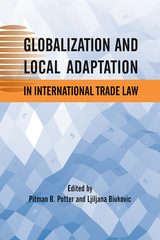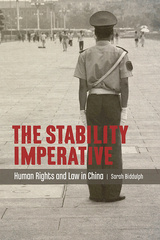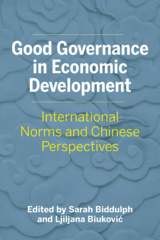
Exporting Virtue?
China’s International Human Rights Activism in the Age of Xi Jinping
Under the leadership of President Xi Jinping, China has attempted to change international human rights values to accommodate its own interests, causing increasing friction with international standards of law and governance.
Exporting Virtue? examines human rights as an example of China’s international assertiveness and considers the implications of internationalizing PRC human rights policy and practice. Pitman B. Potter suggests that in the absence of clear and enforceable global human rights standards, China uses its international influence to promote its human rights policies on global governance, freedom of expression, trade and investment policy, and labour and environmental regulation. The PRC’s efforts to export its human rights principles and standards exemplify the rise of authoritarian governance models internationally. Couched in terms of virtue but manifested as authoritarianism, China’s international human rights activism invites scholars and policy makers around the world to engage critically with the issue.
Drawing on both Chinese- and English-language sources, Exporting Virtue? investigates the challenges that China’s human rights orthodoxy poses to international norms and institutions, offering normative and institutional analysis and providing suggestions for policy response.
Students and scholars of China, international law, human rights, comparative law and politics, and international trade and investment policy will find this an indispensable work, as will policy communities focussed on China’s international relations and business practices.
Exporting Virtue is a meticulously researched and forcefully argued indictment of faux human rights activism that 'seems mainly to be an exercise in justifying authoritarianism, virtue claims notwithstanding.'
This book is a sound corrective to the often-heard but untenable claims by communist dictators in general that economic, social and cultural rights have precedence over civil and political ones.
Potter makes a strong and skilled argument about how China is seeking to change international human rights discourse in a manner consistent with its communist orthodoxy.
Exporting Virtue? will become part of the bedrock of how academics approach the conceptualization of Chinese policy and political culture.
Introduction
1 Human Rights in China Past and Present: From Confucian Governance to Regime-led Development
2 China’s Challenge to International Human Rights Standards: From Qualified Acceptance to Active Revision
3 Case Study: Controlling Political Expression
4 China’s International Economic Relations: Coordination with Human Rights Orthodoxy
5 Case Studies: Coordinating Human Rights and Trade Policy in Labour Relations and Environmental Protection
Conclusion
Notes; Authorities Cited; Index











